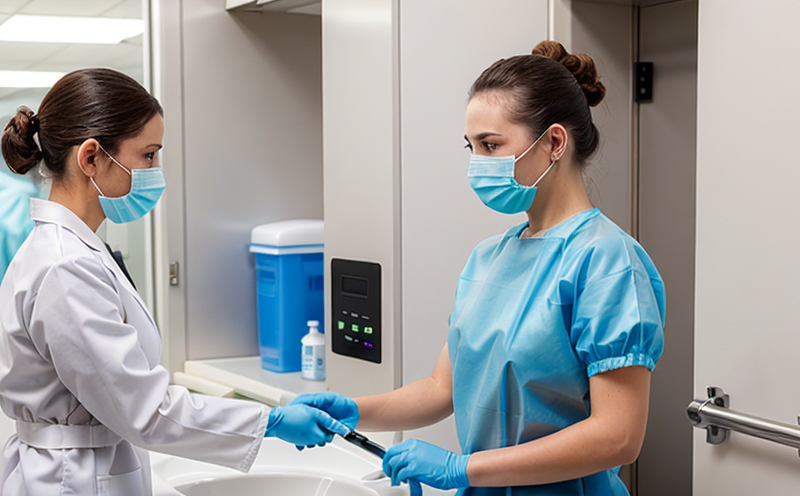Antimicrobial & Hygiene Testing
The field of antimicrobial and hygiene testing is crucial in ensuring that textiles meet stringent standards of safety and effectiveness. This service is designed to verify that textile products can effectively inhibit the growth of microorganisms such as bacteria, fungi, and viruses, thereby enhancing their suitability for use in various sectors including medical, healthcare, home furnishings, and personal care.
The testing process typically involves exposing textiles to a series of standardized methods and protocols aimed at assessing their antimicrobial properties. These tests are conducted using internationally recognized standards like ISO 20743:2016, which specifies the procedures for determining the efficacy of antimicrobial treatments on textile materials. The results help manufacturers ensure that their products adhere to regulatory requirements while providing safe and effective solutions.
Our laboratory uses advanced instrumentation such as incubators, bacterial growth chambers, and spectrophotometers to conduct these tests with precision and accuracy. Specimen preparation is critical in ensuring reliable test outcomes; samples are carefully selected based on the intended use of the textile product. After undergoing rigorous testing, results are provided within a specified timeframe, typically 10-14 business days from receipt of the specimen.
The importance of antimicrobial properties cannot be overstated, especially considering the increasing prevalence of antibiotic-resistant bacteria and other pathogens. Textiles treated with antimicrobial agents can play a significant role in preventing infections and maintaining hygiene in various environments. By adhering to these stringent testing protocols, we provide clients with confidence that their products meet or exceed industry standards.
Our laboratory is equipped with state-of-the-art facilities and experienced professionals who specialize in this area. We offer comprehensive services tailored to the needs of our clients, ensuring they receive accurate results and actionable insights. With a focus on innovation and quality, we are committed to delivering reliable test data that supports informed decision-making.
The benefits of antimicrobial and hygiene testing extend beyond mere compliance; they contribute significantly to public health and safety. By incorporating these tests into their product development processes, manufacturers can ensure that their textiles not only meet regulatory standards but also provide added value in terms of safety and performance.
Benefits
The benefits derived from antimicrobial and hygiene testing are multifaceted and far-reaching. Firstly, it ensures compliance with relevant international standards such as ISO 20743:2016, which is essential for market access in many countries. Secondly, it enhances brand reputation by demonstrating a commitment to consumer safety and well-being.
Additionally, successful completion of these tests can lead to increased sales and customer satisfaction due to the perceived enhanced quality and reliability of the product. For R&D engineers and quality managers, this service provides invaluable data that aids in optimizing formulas and improving product performance. It also helps procurement teams source materials from suppliers who meet stringent hygiene criteria.
From a broader perspective, antimicrobial textiles contribute positively to public health by reducing the spread of infectious diseases. This is particularly important in healthcare settings where patient safety and infection control are paramount. In residential applications like bedding or upholstery, such properties can significantly improve living conditions for individuals with compromised immune systems.
Why Choose This Test
Choosing antimicrobial and hygiene testing is a strategic decision that offers numerous advantages over traditional approaches. It ensures that your products not only meet but exceed regulatory requirements, thereby reducing the risk of non-compliance penalties and recalls. Moreover, it positions your brand as a leader in innovation and quality assurance.
The process involves meticulous specimen preparation followed by exposure to various antimicrobial challenges under controlled conditions. Our laboratory’s expertise lies in replicating real-world scenarios that accurately reflect how textiles perform in actual use. This approach ensures that the results are not only reproducible but also reflective of practical performance.
For R&D teams, this service provides critical insights into the effectiveness of different antimicrobial treatments and their impact on textile properties such as colorfastness and durability. Compliance officers benefit from clear evidence supporting regulatory compliance, which can be used during audits or when addressing customer concerns. In summary, choosing our antimicrobial and hygiene testing service means investing in a future where your products are trusted and relied upon for their superior performance and safety.
Competitive Advantage and Market Impact
In today’s competitive market, offering products that stand out through enhanced hygiene properties can be the key to differentiation. By providing antimicrobial textiles, manufacturers can appeal to health-conscious consumers who demand safer environments in their daily lives. This not only enhances customer satisfaction but also fosters brand loyalty.
From a broader industry perspective, adopting these practices contributes positively to public health by reducing instances of healthcare-associated infections and promoting better hygiene practices globally. In residential settings, the use of antimicrobial textiles can lead to healthier living spaces, especially beneficial for households with children or elderly individuals.
The impact goes beyond individual products; it influences entire supply chains. Suppliers who offer compliant materials gain an edge in competitive markets, while manufacturers who integrate these features into their offerings see increased market share and customer trust. Compliance officers play a crucial role in ensuring that all aspects of the production process align with regulatory expectations, thereby safeguarding both brand reputation and consumer confidence.
In summary, investing in antimicrobial and hygiene testing equips businesses with the tools necessary to thrive in an increasingly health-conscious world. It fosters innovation, enhances product quality, and drives market demand for safer, more effective textiles.





